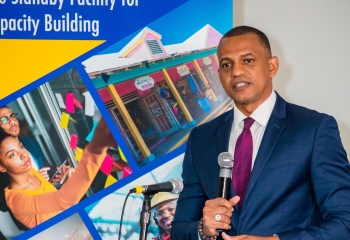Premier, it is with a sense of tremendous satisfaction and optimism, and yes, a tinge of sadness that I deliver the closing remarks for the 52nd annual meeting of Caribbean Development Bank (CDB). Chair, I first wish to thank you for agreeing to host the meeting in your little slice of paradise. You and your team have worked tirelessly to make this meeting a success and have been extremely accommodating and gracious in meeting our needs. (Of course, the tinge of sadness is that we have to leave paradise, even though we can always come back.)
The discussions with Governors as well as the seminars that were held over the past two weeks have not only provided food for thought, but have also showcased the wealth of talent in the Caribbean and the passion in our people to see the Region excel – particularly among our youth.
From all accounts the William G. Demas lecture delivered this year by President of the African Development Bank (AfDB), Dr. Akinwumi Adesina was a resounding success. I especially appreciated his illustration of the AfDB’s vision for Africa while providing a practical example of the economic and social transformation that is possible when visionary leadership is coupled with robust resource mobilisation and the institutional capacity to implement projects and policy reforms. We are looking forward to working with the AfDB having cemented our relationship with the execution of an MoU during the meeting. It is high time that Africa and the Caribbean form partnerships for inclusive and sustainable development.
Governors, as we have heard repeatedly over the past few days and indeed elsewhere, the development prospects for our Region are in peril. Before we can get a handle on one crisis another looms. I need not remind us that last year it was COVID and a volcano; this year it is COVID, the Russia-Ukraine war and the 2022 Atlantic hurricane season beckons with increasingly severe systems predicted. We must move swiftly to a state where these exogenous shocks are but temporary glitches on the radar rather than seemingly permanently compromising the chance for inclusive and sustainable development. We must be able to respond and recover in the shortest possible time so as to minimise the impact on livelihoods.
As I reflect on the state of affairs in the Region and the urgency with which we must act combined with the insightful and intuitive exchanges over the past few days, I am compelled to share a few parting thoughts, which we must keep at the forefront of our minds as we move forward with deliberate haste to create the future we have imagined propelled by resilience and innovation.
First, the quantum of resources needed by the Region to evolve a resilient ecosystem is only daunting if we see it as our individual responsibility to mobilise. Instead, I take this opportunity to reiterate that if we form the coalition for development, pooling our joint capacities, mobilising funds from multiple sources, traditional and non-traditional, then it is not only possible it is probable that we can increase investment in the region to the levels required.
Secondly, as we chart a way forward to more fairly determine access to affordable financing, I am reminded of SDG 8 which calls for us to develop a global partnership for development with targets related to the channeling of Official Development Assistance (ODA). Governors, meeting those targets related to ODA will be of no value if access to affordable finance is determined purely by GNI – in fact, we will only succeed in perpetuating inequality. As demonstrated during our seminar on measuring resilience and vulnerability the Recovery Duration Adjuster is the answer. I therefore thank the Board for its support in pioneering this bold and innovative initiative and we look forward to infusing this tool into our programming.
Thirdly and in keeping with our thrust for innovation we must dare to be different and flexible. In this sense we must be able to increasingly mobilise significant private sector financing for development.
Finally, as one of the oldest and one of the most impactful regional public goods, CDB is only as strong and as effective, as our members and their collective voices. We remain deeply grateful for the confidence reposed in the Bank as illustrated in the statements made by respective governors yesterday. I strongly urge that now is the time to make those voices louder. In this vein, I intend to deepen my engagement with our Board of Directors and Board of Governors, recognising that every member country of CDB brings value to this organisation and is critical to the delivery of our mandate. To the outgoing Chair, Premier Charles Washington Misick, your unbounded passion for TCI and this Region has made you one of our strongest advocates and we know that we can continue to rely on your support. To our incoming Chair, Prime Minister of Saint Lucia, Philip Pierre, we eagerly look forward to working with you to craft and execute your vision for your coming tenure as Chairman of the Board of Governors.
Governors, let us use this 52nd meeting as a sort of demarche – a signal of recommitment, refocus, and resolve. Supported by capable and competent staff to whom I am exceedingly grateful, I know CDB is ready and will deliver. Abraham Lincoln said “the best way to predict the future is to create it” and Marcus Garvey said “with confidence, you have won before you have started” – Let us therefore go forward with confidence and create our best future.

